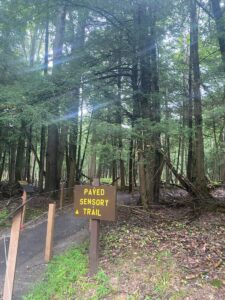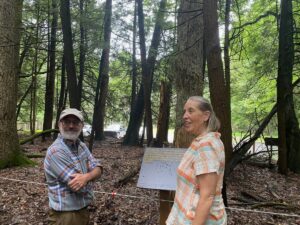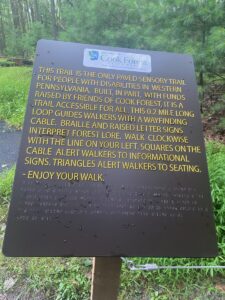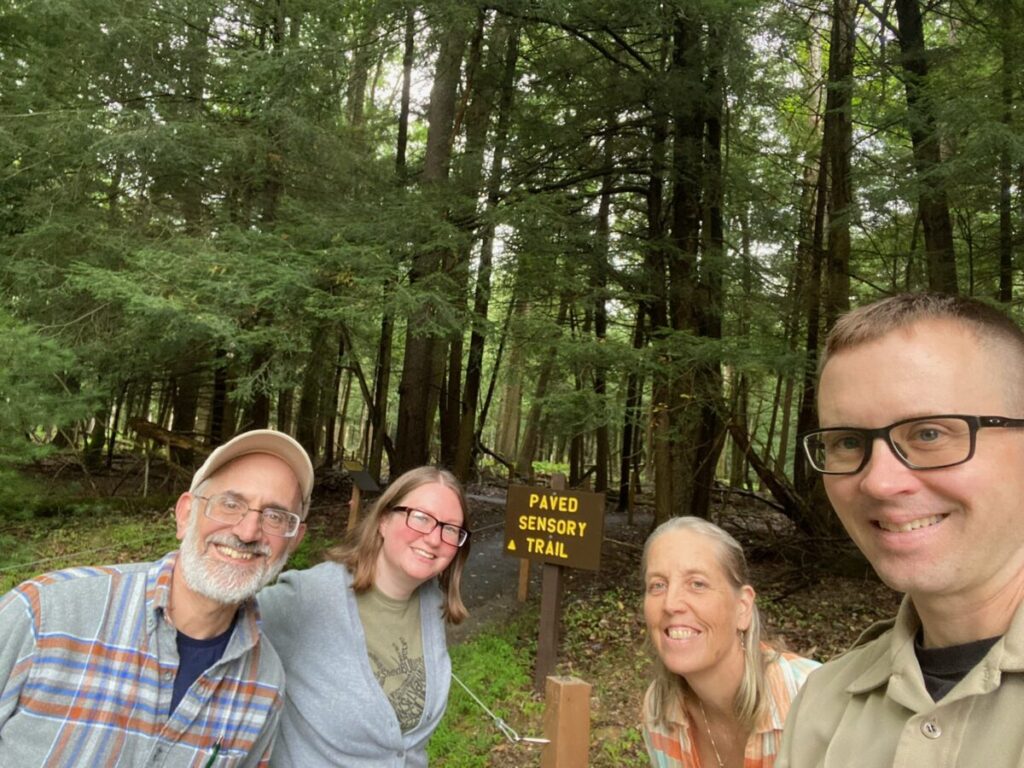PA Wilds Planning Team takes walk on Cook Forest Sensory Trail after August meeting
Photo: Matt Marusiak (Land Protection Manager for the Pennsylvania Wilds region of the Western Pennsylvania Conservancy), Britt Madera (Communications Manager of the PA Wilds Center for Entrepreneurship), Meredith Hill (Acting Deputy Secretary of Conservation and Technical Services for the PA Department of Conservation and Natural Resources), and Ryan Borcz (Cook Forest State Park Manager).
As part of an excursion following the PA Wilds Planning Team’s August meeting, a park manager from the Pennsylvania Department of Conservation and Natural Resources (DCNR) guided the group on a walk along the Sensory Trail at Cook Forest State Park.
The tour was especially meaningful, as the Cook Forest Sensory Trail earned the 2023 PA Wilds Champion Award for Great Places. The PA Wilds Champion Award for Great Places honors innovative asset development and promotion that have worked together to create an excellent new or revamped sustainable tourism destination within the Pennsylvania Wilds.
 The first sensory trail in the PA State Park system, the Cook Forest Sensory Trail is a ¼-mile paved loop that was customized for blind and physically disabled individuals, and it features braille/raised letter signage, a guide cable, sturdy benches, and a picnic area at the trailhead. The Friends of Cook Forest, a volunteer, non-profit group dedicated to enhancing Cook Forest State Park, converted the quarter-mile paved trail into a Sensory Trail that will enable individuals with visual or physical impairments to experience the wonders of Cook Forest in an entirely new way.
The first sensory trail in the PA State Park system, the Cook Forest Sensory Trail is a ¼-mile paved loop that was customized for blind and physically disabled individuals, and it features braille/raised letter signage, a guide cable, sturdy benches, and a picnic area at the trailhead. The Friends of Cook Forest, a volunteer, non-profit group dedicated to enhancing Cook Forest State Park, converted the quarter-mile paved trail into a Sensory Trail that will enable individuals with visual or physical impairments to experience the wonders of Cook Forest in an entirely new way.
The concept of adapting the existing ADA-accessible trail loop into a sensory trail was first brought to the Friends of Cook Forest board in the fall of 2020 by Mike and Mary Beth Doyle. The trail was dedicated in summer 2022.
Cook Forest State Park Manager Ryan Borcz led the short journey around the Cook Forest Sensory Trail for members of the PA Wilds Planning Team who were able to stay after the meeting. He explained how visitors, from both near and far, frequently ask about the trail and described how it has been used by visitors so far.
 Along the walking trail, signs point out new ways of experiencing nature, such as listening for bird calls or touching the bark of trees to identify them. A flexible railing allows visitors to easily find where the trail leads. The thought is that, when these small but purposeful adjustments are made to improve accessibility, it improves the experience for everyone.
Along the walking trail, signs point out new ways of experiencing nature, such as listening for bird calls or touching the bark of trees to identify them. A flexible railing allows visitors to easily find where the trail leads. The thought is that, when these small but purposeful adjustments are made to improve accessibility, it improves the experience for everyone.
“Making these outdoor spaces accessible to everyone can be difficult, but it’s important and so worth it. I applaud the vision and hard work of the Friends of Cook Forest and our park staff to make this amazing trail experience a reality at Cook Forest,” said Meredith Hill, Acting Deputy Secretary of Conservation and Technical Services for the PA Department of Conservation and Natural Resources.
 Prior to the Cook Forest Sensory Trail tour, the PA Wilds Planning Team (PWPT) meeting was held at the Cook Forest State Park Visitor Center. Britt Madera, communications manager for the PA Wilds Center gave an update about the Center’s recent work and upcoming projects. She also gave a brief overview of the Wilds Cooperative of Pennsylvania (WCO) and how artisans, businesses, nonprofits and other organizations can network together to benefit from the PA Wilds’ place-based brand by joining the growing network for free.
Prior to the Cook Forest Sensory Trail tour, the PA Wilds Planning Team (PWPT) meeting was held at the Cook Forest State Park Visitor Center. Britt Madera, communications manager for the PA Wilds Center gave an update about the Center’s recent work and upcoming projects. She also gave a brief overview of the Wilds Cooperative of Pennsylvania (WCO) and how artisans, businesses, nonprofits and other organizations can network together to benefit from the PA Wilds’ place-based brand by joining the growing network for free.
Nathan Reigner, Pennsylvania’s Director of Outdoor Recreation, spoke about plans for the Commonwealth’s Office of Outdoor Recreation. He outlined how the outdoor recreation industry continues to grow in Pennsylvania and throughout the nation, as well as how the outdoor industry provides a boost to other industries and the overall wellbeing of residents.
Jamie Klebanski from the Allegheny National Forest (ANF) gave a report about this year’s 100th anniversary for the ANF. She also invited the PWPT to attend the upcoming Allegheny National Forest Centennial Celebration from 11 a.m. to 7 p.m. on Sunday, September 24 at Twin Lakes Recreation Area.
Other brief updates were given by other members of the Planning Team in a round robin-style discussion. Planning Team members from both Warren County and Cameron County gave their thoughts on this year’s Wilds Are Working initiative, which gave the opportunity for a handful of remote workers to relocate to Emporium and Warren for four weeks during the months of July and August, allowing them to “test drive” what it’s like to live in the PA Wilds.
ABOUT THE PA WILDS
The Pennsylvania Wilds is a 13-county region that includes the counties of Cameron, Clarion, Clearfield, Clinton, Elk, Forest, Jefferson, Lycoming, McKean, Potter, Tioga, Warren, and northern Centre. The PA Wilds Center for Entrepreneurship, Inc., is a 501(c)3 nonprofit organization whose mission is to integrate conservation and economic development in a way that inspires the communities of the Pennsylvania Wilds. The PA Wilds Center promotes the region as a premier outdoor recreation destination as a way to diversify local economies, inspire stewardship, attract investment, retain population and improve quality of life. The PA Wilds Center’s core programs seek to help businesses leverage the PA Wilds brand and connect with new market opportunities, including: the Wilds Cooperative of PA, a network of over 300 place-based businesses and organizations, and the PA Wilds Conservation Shop, a retail outlet primarily featuring products sourced from the WCO. For more information on the PA Wilds Center, visit www.PAWildsCenter.org. To learn more about the WCO, visit www.WildsCoPA.org. Explore the PA Wilds at www.PAWilds.com. Find regionally made products at www.ShopThePAWilds.com.
ABOUT THE PA WILDS PLANNING TEAM
The PA Wilds Planning Team is one of the largest and longest-standing governance structures around the PA Wilds effort. It was formed in 2006 through a groundbreaking Intergovernmental Cooperation Agreement (ICA), the largest geographically of its kind in Pennsylvania. The ICA brings together the region’s county governments, typically through representation of the county planner, the region’s four Economic Development Districts, two Heritage Areas, visitor bureaus, PA Wilds Center, conservation partners and others to work on regional planning issues related to outdoor recreation development.

